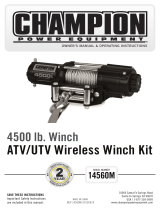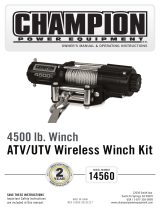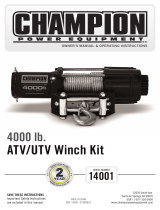
Page of
؍WARNING
This product may contain chemicals known to the State of California to cause cancer, birth defects or
other reproductive harm. Wash hands after handling.
؍WARNING
WORK AREA SAFETY
Inspect the work area before each use. Keep work area clean, dry, free of clutter, and well-lit.
Cluttered, wet, or dark work areas can result in injury. Using the electric winch in confined work
areas may put you dangerously close to other cutting tools and rotating parts.
Keep children and bystanders away from the work area while operating the tool. Do not allow
children to handle the electric winch.
؍WARNING
PERSONAL SAFETY
Stay alert, watch what you are doing, and use common sense when operating the electric winch.
Do not use the electric winch while you are tired or under the influence of drugs, alcohol, or
medication. A moment of inattention while operating the tool may result in serious personal injury.
Dress properly. Do not wear loose clothing, dangling objects, or jewelry. Keep your hair, clothing
and gloves away from moving parts. Loose clothes, jewelry, or long hair can be caught in moving
parts. Air vents on the tool often cover moving parts and should be avoided.
Wear the proper personal protective equipment when necessary. Use ANSI Z87.1 compliant
safety goggles (not safety glasses) with side shields, or when needed, a face shield. Use a dust
mask in dusty work conditions. Also use non-skid safety shoes, hardhat, gloves, dust collection
systems, and hearing protection when appropriate. This applies to all persons in the work area.
Do not overreach. Keep proper footing and balance at all times.
؍CAUTION
ELECTRIC WINCH USE AND CARE
Inspect before every use, do not use if damaged or parts loose. Examine the winch for structural
cracks, bends, damage, frayed or kinked wire rope, and any other conditions that may affect the
safe operate of the winch. Do not use the winch even if minor damage appears. A kink
permanently weakens the wire rope, even after it is straightened out; kinked wire rope can fail
suddenly and must not be used.
Do not force the electric winch. Products are safer and do a better job when used in the manner
for which they are designed. Plan your work, and use the correct electric winch for the job.
Store the electric winch when it is not in use. Store it in a dry, secure place out of the reach of
children. Inspect the electric winch for good working condition prior to storage and before re-use.
Use only accessories that are recommended by the manufacturer for use with your electric winch.
Accessories that may be suitable for one product may create a risk of injury when used with
another tool. Never use an accessory that has a lower operating speed or operating pressure than






















